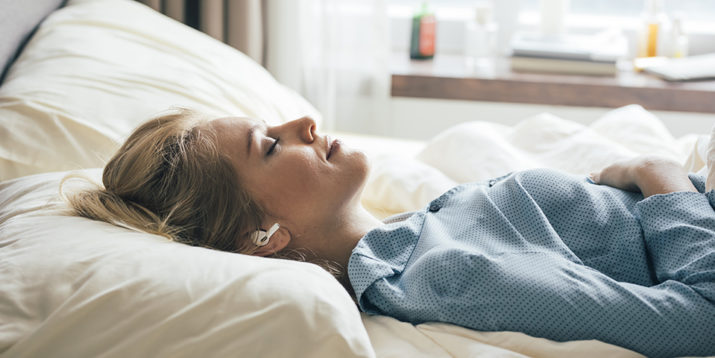Clear Your Head With Sleep Meditation

When we sleep, our bodies heal and our minds unravel. Sleep is our daily recovery from a busy and stressful day.
However, nearly 40 percent of 20-to-39-year-olds are sleeping less than the recommended seven to nine hours, according to the American Sleep Association — and that was before the pandemic,
Lots of us are also experiencing “coronasomnia.” Studies have found stressful events, such as COVID-19, can trigger sleep issues.
But even something as short as a 10-minute meditation has benefits that can help you cope with everything going on.
Meditation also relaxes your mind for sleep. In fact, the Dalai Lama advised, “Sleep is the best meditation.”
What Is Sleep Meditation?
Practicing meditation any time of day generally strengthens your nervous system’s rest-and-digest function.
While this can help reduce anxiety and improve focus during the day, at night, it can invite relaxation, according to Benjamin Irons, CMI, owner of Zen with Ben.
Studies have also found mindful meditation can improve sleep quality.
There are a few options for incorporating sleep meditation into your bedtime routine.
“Practices of meditation, gratitude, loving kindness, and yoga are all beneficial to help you fall asleep easier and stay asleep,” says Gretchen Schutte, E-RYT 500, who also specializes in yoga nidra, a form of guided meditation.
How to Prepare for a Sleep Meditation
“It’s helpful to meditate in a place you associate with quiet and calm,” says Irons, which includes your bedroom.
“It helps to establish a practice routine — same time, same place, and same style — until you feel comfortable to branch out, challenge yourself a bit, and grow in the practice,” he explains.
“My sleep ritual includes no screens for at least 30 minutes before bed, a warm shower with lavender soap, practicing a gentle inversion like legs up a wall for three to five minutes, while reflecting on what I am grateful for that day,” advises Schutte.
According to Irons, here are three sleep meditations you can do in bed, lights out, eyes closed, and ready for sleep.
1. Breath Connection
Start by relaxing into your bed, close your eyes, and surrender to gravity.
“Visualize inhaling a healing light and exhaling a stream from your feet, releasing any tension, thoughts, or emotions that are no longer serving you — and let go,” says Irons. “Allow the exhalation to be longer than the inhalation.”
Set your intention to fully rest through the night and think, “I give myself permission to sleep now and will awake again on time, feeling rested and refreshed for a new day.”
2. Body Scan
The basic goal of a body scan meditation is to find tension in the body, while focusing on the breath, explains Iron.
“Inhale, scan the body for tension. Exhale, release any tension or negative emotions.”
Iron recommends working in a progressive and systematic fashion, either from head to feet, or vice versa. “Spend at least three long breaths in each region and continually surrender to relaxation like a trust fall,” he says.
For any “sticky” areas, try gently constricting your muscles as you inhale and releasing as you exhale. Think of connecting your breathing to your body like a massage.
3. Energy Exchange
This practice is similar to tidying up before bedtime or not waking up to a pile of dishes in the sink.
“Visualize yourself returning all the energy — thoughts, opinions, and emotions — you’ve collected from others throughout the day to their source,” says Irons. “Any energy that is not yours should return to its home.”
After you feel this has been completed, “Invite your energy to return back to you for a sense of unity and centering,” Irons says. “Call back any energy you willingly or unwillingly gave away. Welcome your energy back, feeling calmer and more relaxed with each breath as you slip away into restful sleep.”
Guided Sleep Meditations and Apps
“A guided relaxation meditation can help your body relax and prepare for sleep,” says Schutte.
“Yoga nidra, which you can practice any time of day, is scripted in a way that guides the body and mind to a place of deep relaxation,” she adds.
If you want to incorporate sleep meditation music, Irons says, “Any relaxing music combined with breath work when you’re ready for bed will be effective.”
Unstress: 21 Days of Meditation for Relaxation, Calm, and Less Anxiety
Another option for guided meditation are apps like Unplug. For a quick and easy way to get started with daily meditation, BODi teamed up with Unplug for Unstress, a 21-day guided meditation program.
Unstress helps you tackle stress and anxiety, clear your mind, and improve your sleep in about 10 minutes a day.


